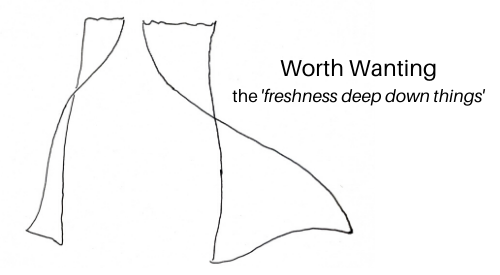
What happens when we encounter? It’s wild? Let me tell you.
To make myself clear, I’m going to introduce a new term to talk about the global environment of others and othernesses that we all live in–my alitorium, our alitoria. (The word comes from the Latin alium, as opposed to the word for self, sui.)
My environment of others and othernesses, my alitorium, can be described thus:
- it’s a plentitude, an abundance of others and othernesses.
- some others and othernesses are primarily objective (outer), and others subjective (inner).The power my background has over me is subjective, but the background itself is objective and historical, for instance.
- the others in my alitorium can be thought of as those known, those known of, and those unknown, that last category often a place-holder for new discoveries.
- the others and othernesses in my alitorium have a positive or negative or mixed valence of greater or lesser intensity.
- others and othernesses in my alitorium are more prominent and more salient, the more pertinent they are to my basic motives (survival, comfort, dignity) or agendas (profit, power, perpetuation).
Our alitoria are pretty stable in contour, composition and internal configuration over time, so our behaviors and beliefs are generally consistent and predictable, which is a convenience for everyone. What if, however, two people come together for an encounter,each ready to risk changes in the contours, composition or internal configuration of their alitoria, a readiness I call livingness.
First off, and throughout their interaction, they get to know each other’s alitorium by observing what powers they exert, what energies they expend, what potentialities they exploit, what altogether we might call their pep. These observable behaviors or beliefs, explicitly or implicitly, are clues to their alitoria.
For instance, under powers being exercised, the other may exhibit patterns of allowing, authorizing or chartering; or hindering, obstructing, encumbering. Under energies being expended, the other may be struggling, striving; or changing position, rate or direction. Under potentialities being exploited, the other may responding to the latent possibilities of someone or something concealing or exposing; or becoming decisive; or arriving out of the blue. For a fuller list, click here.
Let’s say, my alitorium and yours come into contact in a non-encounter mode.. What happens? Well, of course, we can learn from each other, confirming, correcting, modifying specific components of our alitoria in the interests of accuracy, efficiency, and so on, but the contours and composition of our alitoria won’t significantly change if our contact only mundane.
But what if our alitoria, each ready and sensitive, our livingness levels high, come together in an encounter? Something wonderful happens. Freshness flows in and through the encounter space, filling it with the perfume of beyondness. Particular elements of the alitorium of each begin to glow with interestingness for either or both, these elements becoming more, or newly, impressive, intriguing, intimate. And sometimes, some of these radiant elements can passionately couple and engender things new, never before present in either or, best, in both of us.
I blush to write this, but encounters can in fact can be as powerful as I suggest here. I have known this joy particularly when working on thought projects like this one. The exhilaration is one of the best reasons for living.
The contours and composition of our alitoria are thereafter different. Seeded with something new or newly interesting, the inner architecture of our alitorium responds, perhaps rapidly or maybe very slowly. How is this change manifest to ourselves or others? In our pep, our regular observable patterns of excising power, expending energy, exploiting potentialities.
Encountering is a thrilling way of life, though some encounters are more sedate. This is the good news we are here to celebrate.
